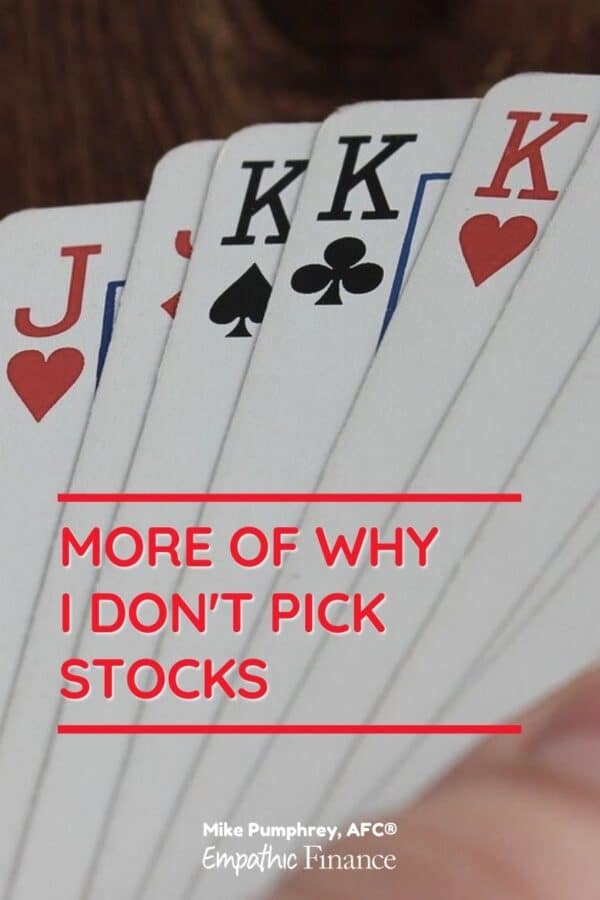Think you can pick the right stocks that will make you rich? You’re probably wrong, as are most people, including me.
Investing your money for the future is actually pretty simple, and quite boring.
If you put your money in reasonably-diversified low-cost index funds using tax-advantaged accounts like a 401(k) or IRA, and you keep doing this throughout your working life, then congrats, I’ve just made you a millionaire.
But I know that in this world of late-stage capitalism, some think that that’s not enough to do things the “normal” way, and that their only way to achieve financial freedom is to bet it all, and hope to win big.
This explains why people take out mortgages and throw it all into Bitcoin, and other “get rich quick” schemes.
Desperation, as always, is a great money maker, just not for you.
And one way that people think they can build wealth is through buying stocks. We saw this at the beginning of the pandemic, when people on Robinhood would buy meme stocks like Gamestop to try and win big.
It should be said: most people do not win big.
Every once in a while, I look at business news, and start to form an opinion on a company. And I think, “maybe I should get in on this one?”
Thankfully, I never do. (Well, rarely, but that’s another story.) But here’s yet another case where what I thought would happen was comically incorrect.
Table of Contents
Google’s bust (2005)
I’ve told this story before, but just to recap:
In 2005, my friends and I were sitting around and talking about tech companies. Specifically, we were looking at Google, and noting that its business model of ads was very flimsy, and certainly unsustainable. The whole company felt like a house of cards.
“We should totally short this stock!” we said.
Well, you of course can guess what happened.
Just looking at stock prices (and taking into account the 20:1 stock split in 2022), the stock was at around $11 at the end of 2005, and is trading at a little under $200 today.
Or, by another calculation from The Motley Fool, any money invested around the time of Google’s 2004 IPO would be worth 55 times that today, a cool yearly return of 22%.
Glad I never followed through with that plan!
Mining bust (2022)
For the longest time, graphics cards for computers were nearly impossible to find, and always unaffordable.
This was because people were using them to mine cryptocurrency such as Ethereum. At the peak of the frenzy, off-the shelf graphics cards could net you a couple of dollars of day just for whirring around in the background and accelerating the heat death of the universe using some electricity.
But this all came to an end when Ethereum switched to “Proof of Stake”, the details of which aren’t important here, but suffice to say that graphics cards weren’t useful any more.
All over the world, people ditched their burned out graphics cards on the secondhand market.
I watched this, and thought “well, it sure must suck to be NVIDIA now. That company certainly overextended itself. Its stock is definitely going to tank.”
Then, not three months later, a little product called ChatGPT was released into the wild, went viral, and changed the entire computing industry.
The massive amount of computing power required to output this spicy autocomplete was a perfect match for—you guessed it—graphics cards.
And guess whose graphics cards were the best at doing this? You guessed it: NVIDIA.
NVIDIA’s stock was around $15 at the end of 2022. Last month it reached over $130. Last year NVIDIA became one of the few trillion dollar companies, and this year it briefly overtook Microsoft and Google to become the world’s most valuable company.
Once again, I’m glad I didn’t act on my impulse to short that stock!
Stopping short
Now, I know these examples both talk about shorting stocks, but the principles of shorting a stock hoping it will go down and buying a stock hoping it will go up are the same. It’s a bet, a gamble, a risk.
And unless you have inside information (which is illegal to act on), it probably won’t work.
You certainly won’t make the big money. The only way to do that in the short term is to buy things like penny stocks, very cheap stocks that could go up to a reasonable value, but mostly just collapse.
What to do instead
I hate to break it to you, but the bigger the bet you make, the harder the potential loss.
But don’t fret, until you’ve tried my plan, you can’t say it won’t work.
Here’s what you do:
First, get out of your non-mortgage debt (which you have to do first, otherwise your earnings will just go to interest).
Then, using either your 401(k) if you have it, or an IRA if you don’t, buy passive mutual funds called index funds, the broadest ones you can find. You don’t need many, like the Lazy Portfolios out there. Then contribute to these funds on autopilot, every month, with up to 15% of your income if you can spare it.
Once you set this up, you will already be on the way to building serious wealth, no big bets—or short sells—required.



